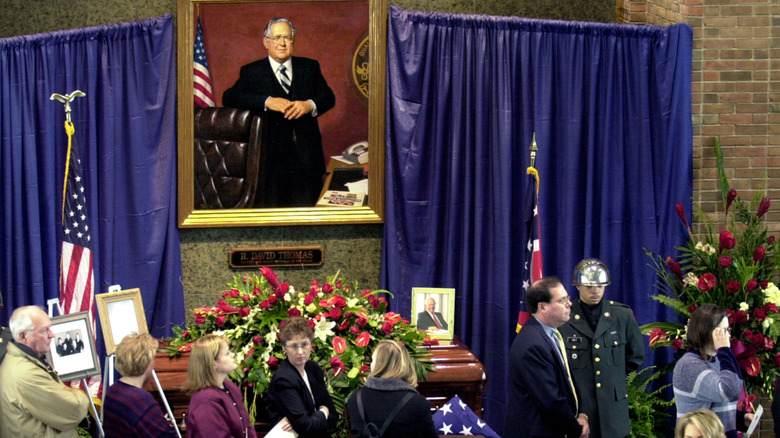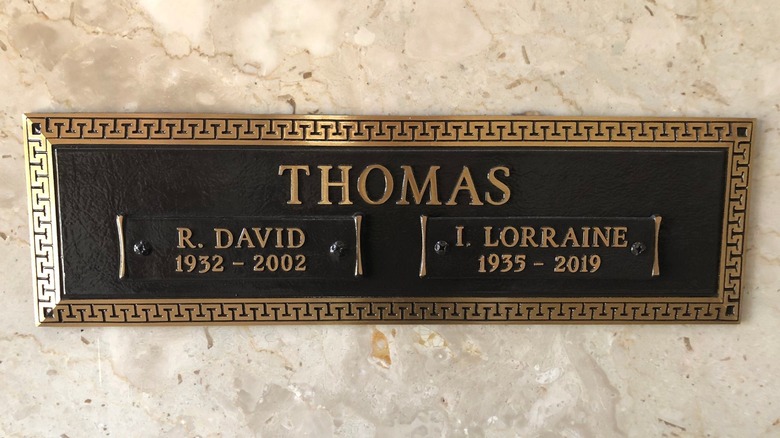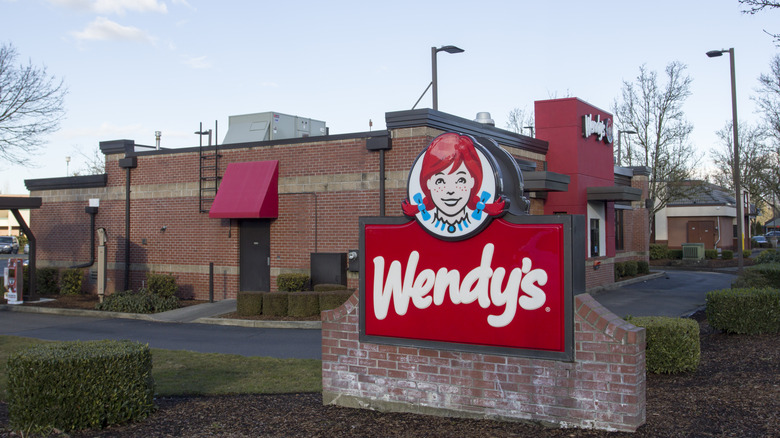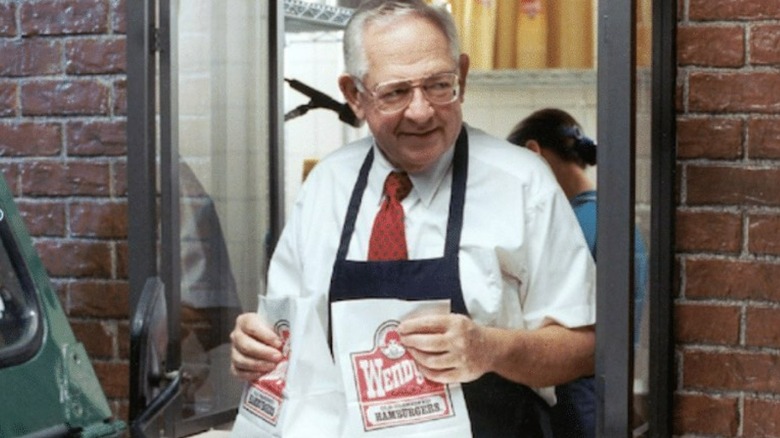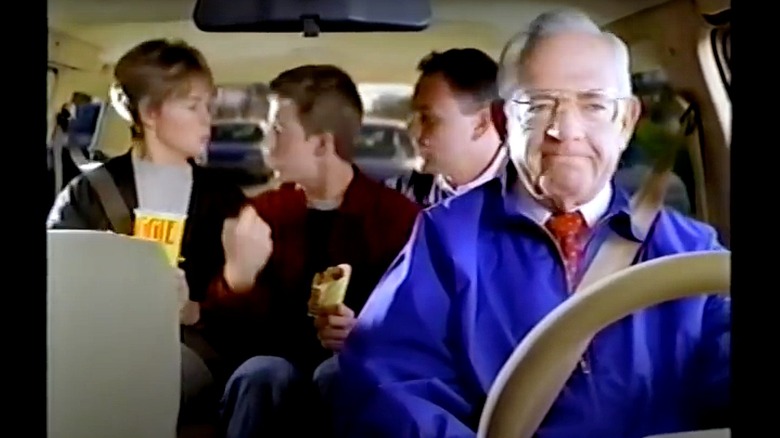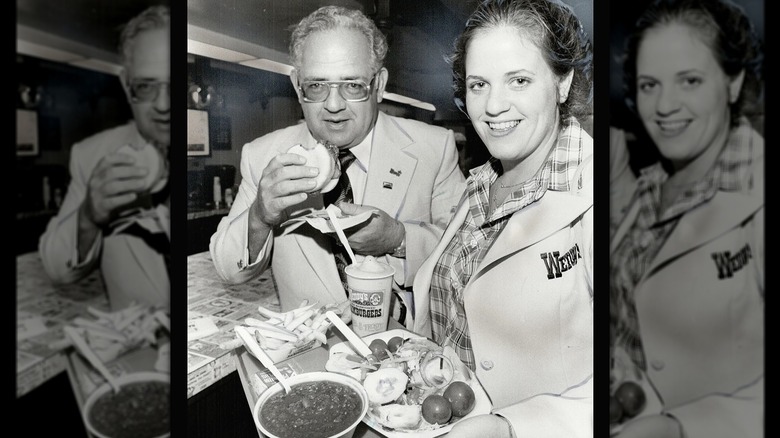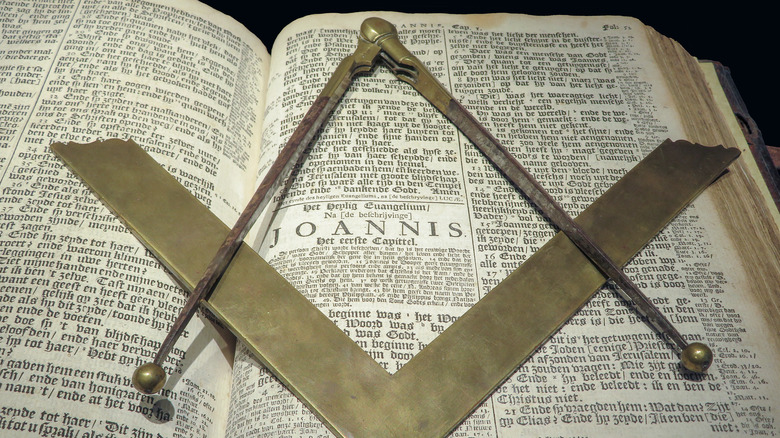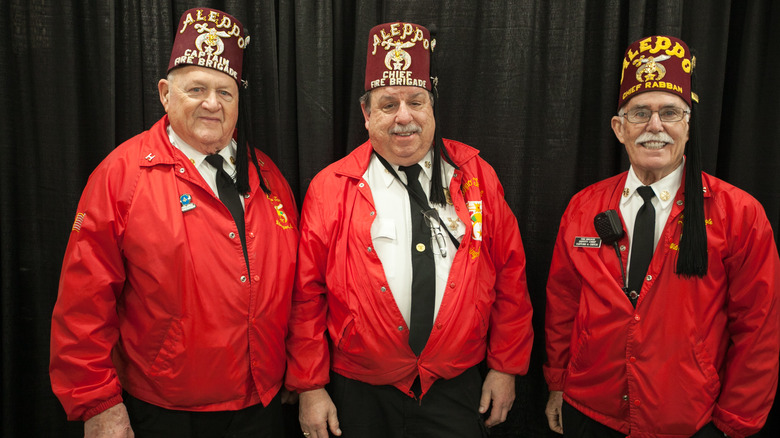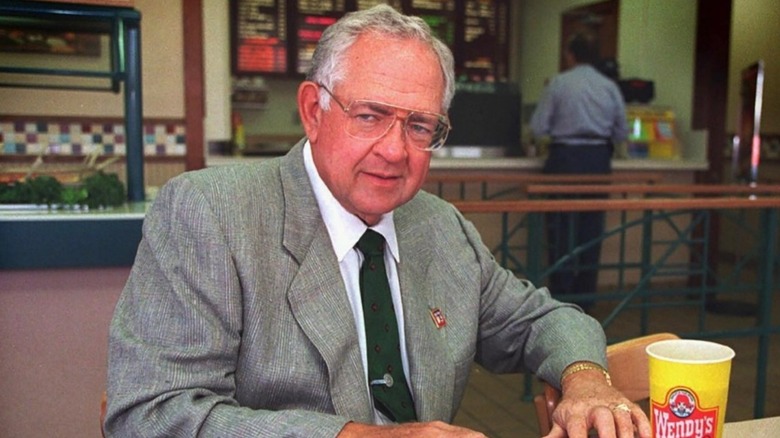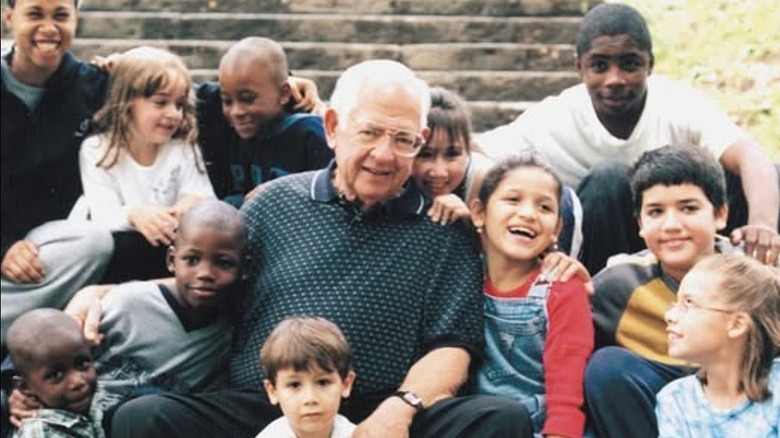What's Come Out About Wendy's Founder Dave Thomas After He Died
When fast-food mogul Dave Thomas died in January 2002, America knew him as a humble hamburger spokesman. The Wendy's founder embraced a self-effacing, simple-guy image in the 300-plus commercials he starred in for the chain. While it's true that Dave Thomas was an unassuming fast-food innovator who championed honest principles, there was more to him than just those white button-down T-shirts and red ties. Thomas' behind-the-scenes story has come into greater focus since his death.
Wendy's naturally cherishes the legacy of the man who established its first restaurant in 1969 and was the face of the franchise for decades. The company's website is filled with Thomas' quotes and accounts of his rags-to-riches story as an adopted kid who found business success and later started a major adoption foundation. As inspiring as his official story is, a lot has come out about Thomas after he died. Some of these details may have been known in some circles, but they weren't widely reported until after Thomas' death.
Dave Thomas was fabulously wealthy when he died
Wendy's had roughly 6,000 restaurants worldwide and was pulling in over $8 billion in annual sales when Dave Thomas died in 2002 at age 69. In the months leading up to his passing, Thomas sold his 4.3% stake in the company, worth $135 million, according to Forbes. He also held on to 3.2 million in Wendy's shares, worth $99 million the day he died. Not too shabby for a guy who dropped out of high school when he was 12.
Thomas became a millionaire in the late 1960s when he was managing Kentucky Fried Chicken franchises and was a protégé of Col. Harland Sanders – a relationship that was occasionally a shaky one. However, it wasn't until he broke out on his own with Wendy's that he hit the next stratosphere of wealth. Wendy's became one of the most popular fast-food chains by the 1980s and grew to be the third most popular burger restaurant in the 1990s (just behind McDonald's and Burger King).
While all this major growth happened after Thomas had stepped down from day-to-day operations in 1982, he maintained enough of a stake in the business to be a very rich man. Celebrity Net Worth estimated his overall net worth to be around $250 million when he died. Among his assets was a 13,446-square-foot oceanfront property in Fort Lauderdale, Florida, that reportedly sold for $7.3 million after his wife Lorraine Thomas died in 2019.
He had been undergoing kidney dialysis for the last year of his life
Dave Thomas spent a decade battling liver cancer, a disease that can also be taxing on other organs like the kidneys. In the last year of his life, he underwent dialysis, a life-saving blood-filtering treatment that compensates for failing kidneys. Thomas also had gall bladder surgery the year before he died in 2001. In 1996, he underwent quadruple bypass surgery after suffering a major heart attack. While it's unclear if these conditions were associated with his liver cancer, the disease can lead to an increased risk of heart attacks.
While Thomas' condition wasn't a secret, he did not discuss the specifics of his treatment in public. Thomas continued to work and appear in Wendy's TV spots as he fought through having a carcinoid tumor, a slow-growing cancer that can cause abdominal pain and nausea. However, his appearances were shortened to "cameos" added to the end of the commercials during the last two years of his life. When Thomas passed away, Wendy's ad agency immediately edited Thomas from the ads out of respect. But he wasn't removed from Wendy's marketing for long. The restaurants soon began hanging posters of Thomas in tribute with a caption of, "We'll always do it Dave's way."
Dave Thomas was sued months before his death
Dave Thomas had to deal with some complicated legal issues relating to a dot-com investment as his liver cancer grew more serious. In 2001, over two dozen investors sued him for allegedly deceiving them into investing in a then-bankrupt online textbook company. The investors filed lawsuits in Tennessee and Florida, claiming they lost a combined $2.8 million in a deal Thomas said would be "better than Wendy's."
The company at the heart of the lawsuit was eCampus.com, which still operates and was founded by textbook tycoon and former Kentucky governor Wallace Wilkinson. According to its "About Us" page, Thomas was an original investor, and the website was launched on his birthday in 1999. The investment group said Thomas broke securities laws because he did not reveal that some of the initial private stock offering went to prop up Wilkinson's failing textbook business.
Thomas also filed a lawsuit of his own, saying he was duped into guaranteeing $25 million in loans for eCampus. He called the investors' case against him "baseless," (via Forbes) and the Thomas family likely lost at least half a million dollars in their dealings with Wilkinson. The final outcome of the case is unclear. However, such lawsuits are often addressed in probate if the defendant dies. It was ultimately revealed that Wilkinson, who died a few months after Thomas, was operating a Ponzi scheme with the investments.
He didn't provide a clear direction for Wendy's to follow after his death
Dave Thomas was the face of Wendy's from the time he started doing commercials for the chain in 1989 until he passed away. And while he helped turn the restaurant around from slumping sales after he first retired in 1982, he had no way of keeping the ship sailing in the right direction after he passed. Wendy's was directionless and struggling with unhappy shareholders in the mid-2000s.
The chain initially saw a sales bump in early 2002, as visits paying tribute to the late founder helped lead to a 10% increase in revenue. However, that success was short-lived, and the company had trouble finding the right marketing approach with Thomas' folksy presence gone. Marketing heads went back and forth on whether to continue including him in advertisements. There was even speculation that Wendy's would introduce a cartoon iteration of Thomas in commercials.
There have been a series of Wendy's flops over the past two decades. According to the Thomas family, one of the biggest let-downs was when the owner of Arby's purchased Wendy's in 2008. While Dave Thomas did not make his wishes for the company public, he would not have approved of the deal, according to his daughter Pam Thomas Farber (per Retail Wire). She said the family supported a buyout offer from a Wendy's franchisee that was rejected by the Wendy's board.
Dave Thomas wished he had named his restaurant after himself
The name Wendy's stems from the nickname of Dave Thomas' daughter, Melinda Lou, who was 8 years old when the restaurant opened. She was also the inspiration behind the chain's iconic logo. The name and image of a little girl with pigtails seem to go perfectly with the Wendy's "Old-Fashioned Hamburgers" moniker. Yet Thomas ultimately regretted naming it Wendy's, saying it put too much attention on his daughter.
In his 1991 autobiography, Thomas recognized that his daughter's image was the right mascot for his company. But he also lamented that she lost some of her privacy. In 2019, the real Melinda Thomas-Morse revealed that her father apologized to her for naming the restaurant Wendy's just before he died. Thomas said he should have named the restaurant after himself, but it's hard to imagine "Dave's" taking off the same way. Melinda Thomas-Morse has handled the attention well, even starring in a series of commercials called "That Wendy's Way" to support the restaurant named after her.
Wendy's commercials starring Dave Thomas turned him into a household name
Dave Thomas starred in so many commercials for Wendy's that the Guinness Book of World Records recognized him for "Most TV commercials starring company founder." The ads were so successful that 90% of Americans recognized him, according to a Wendy's survey. Yet Thomas still seemed surprised when strangers knew who he was.
In a 2024 video from the Old Fashion Masonic Podcast, a man recounts a story where Thomas spoke with him after giving a speech at his school. The humble Wendy's founder did not expect the kid to be familiar with him. Unlike direct competitors McDonald's and Burger King, Wendy's geared their commercials more toward adults. Thomas was brought in to star in commercials when Wendy's was looking to change direction after its successful "where's the beef?" line of ads. At first, the founder had an awkward screen presence, but he eventually came into his own by embracing his natural folksiness with a tinge of humor.
His commercials remain popular with nostalgia-themed YouTube channels, with the most-watched video garnering over 200,000 views. Thomas said that he'd continue to do commercials as long as they connect with audiences. His popularity never waned much, which put Wendy's in a difficult position when he died. In his final ad, he flips a coin between choosing a Bacon Swiss Cheeseburger and a Chicken Bacon Swiss. Who knows what Dave would have thought about Wendy's more irreverent social media campaigns today.
He had a complicated relationship with his children
Growing up as an adopted kid, Dave Thomas had a difficult relationship with his family. His adopted mother died when he was 5 years old, and his adopted father was not affectionate and often abusive. Thomas recalled his dad scolding him for getting fired from his first couple of jobs for simply being under the legal working age. Some of that complicated dynamic got passed down a generation in Thomas' relationship with his own five children.
A few stories documenting this came out during Thomas' lifetime, but online chatter about it has reemerged after his death. He spent most of his time on the road managing his developing fast-food empire when his kids were growing up. In a 1990 People article, his son Ken revealed that his dad didn't really know how to be with his kids. He wasn't the kind of dad who changed diapers or even liked to be home with the family in those days. His daughter Pam related that her mother held the house together as her dad was always tired from work.
Thomas admitted he was a tough father to get along with and likely affected by his own challenging upbringing. He called out the importance of family in his adoption charity, but revealed that being around his kids too much would bother him. Nevertheless, that uneasy relationship seemed to improve as his children reached adulthood, and they have tried to carry on their father's legacy by purchasing several Wendy's since his passing. Melinda "Wendy" Thomas has been the most vocal and often celebrates her father's legacy with adoption causes in articles published after his death.
Dave Thomas was a Freemason
Dave Thomas counted himself as one of the many public figures who were Freemasons. He was initiated in 1959 at The Masonic Temple in Fort Wayne, Indiana, when he was 27 years old and became a member of the Sol. D. Bayless Lodge #359. Around the time he joined the Masons, Thomas was working with Col. Harland Sanders to improve Kentucky Fried Chicken franchises. Sanders was also a Freemason, initiated at Lodge No.651 in Indiana. While it's unclear if Sanders influenced Thomas' entry into the craft, both men achieved the organization's highest 33rd-degree Scottish Rite.
Freemasonry is a fraternal order for men that originated with stonemasons in the 14th century before expanding into a social and philosophical group with lodges all over the world. With the core values of brotherly affection, moral integrity, and personal development, Freemasonry has attracted many high-profile members as well as critics who have denounced the group's secretive practices. While Freemasonry prohibits members from using lodges as business relations forums, the group is often associated with success and wealth, two qualities Thomas and Sanders were definitely interested in.
He was also a Shriner
Charity is an important pillar of Freemasonry that all members are expected to practice, and Dave Thomas took this to heart. He became a member of Shriners International, a Masonic society that focuses on philanthropy. The group is particularly known for its members wearing fezzes and its non-profit network of Shriners Hospitals for Children. To be initiated into the Shrine, you must first progress into becoming a Master Mason.
While it's hard to imagine Thomas ditching his white tee and red tie for a fez and Middle Eastern regalia, he certainly embraced the moral obligation of philanthropy throughout his life. In 1990, President George H.W. Bush named Thomas the spokesperson for a national adoption awareness campaign. Two years later, he established the Dave Thomas Foundation for Adoption to help place foster children into permanent families — a cause he was particularly passionate about as he was adopted. The Shriners and Freemasons continue to embrace Thomas as a brother, saying his Masonry helped to shape his character and achievements.
Dave Thomas' savvy management style maintained the chain's quality
In 1972, Dave Thomas saw success beyond just the four restaurants he maintained in the Columbus area. He franchised Wendy's and saw it grow to 2,200 restaurants and over $1.4 billion in annual sales within 12 years. Thomas felt that the American free-enterprise system was good to him and was not shy about sharing his belief in capitalism and hard work with others. This was part of the "Wendy's Way" that he would spread like gospel in work meetings across the country.
In a 2015 blog, a Wendy's International team member recalled the excitement fellow managers felt when Thomas attended one such meeting in 1979. The memorabilia she found from the session included an autographed photo and a handwritten note that read "Free Enterprise System – Greatest Economic System in the World."
That belief is reflected in his "five rules," which include his belief that "profit is not a dirty word." When profits started to fall after his retirement in 1982, he was enticed back to push his Wendy's Way again. Thomas was known for visiting franchises and encouraging managers to get his MBA (mop-bucket attitude) degree, which the chain still gives out. Ultimately, his efforts were all about following the "Quality is our recipe" motto and serving the customer, which Wendy's has been struggling with recently.
Dave Thomas never voiced a stance on LGBTQ+ adoption
The Dave Thomas Foundation for Adoption has embraced LGBTQ+ adoptions, which has angered some Christian conservatives who feel this would not have aligned with Thomas' views. While Thomas was generally associated with conservative politics, he never voiced a stance on LGBTQ+ adoption during his lifetime. The legality of same-sex adoptions varied between states during Thomas' lifetime, and there's no record of him making a statement on the matter. However, Wendy's was among the companies to pull advertising from the "Ellen" episode in which the main character — played by Ellen DeGeneres — came out as lesbian.
The issue entered the spotlight earlier this year after the Foundation included an LGBTQ+ couple in an ad campaign. Thomas seemed apolitical when it came to his adoption charity, with the primary focus always being to help place as many foster children in loving families as possible. In 2017, a U.S. Supreme Court ruling allowed for same-sex spouses to be listed on birth certificates in all 50 states. The Foundation, which has helped over 15,000 foster children since 2004, supports any foster or adoptive family "regardless of parent structure, marital status, sexual orientation, gender identity, disability, race or religious affiliation," according to its justice statement.
